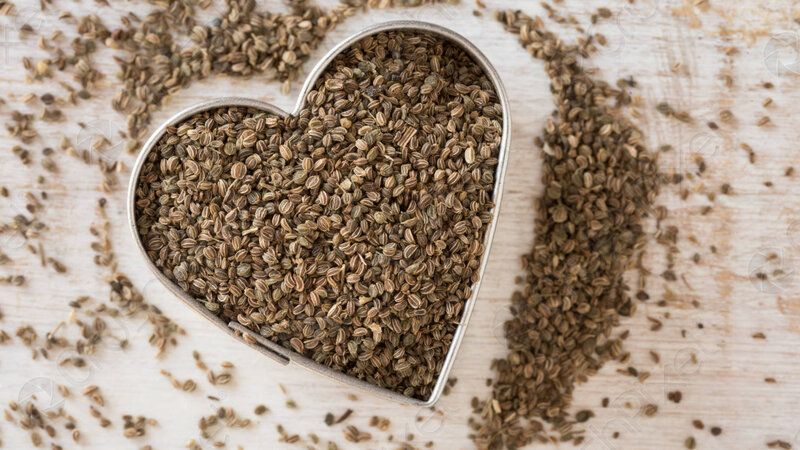Ajmoda – The Herb of Life: Properties, Health Benefits and Usage
When it comes to aromatic and flavorful seeds, the Ajamoda, commonly known as Ajwain, stands out as a prominent spice in the world of culinary delights. Native to the Indian subcontinent, this small yet powerful seed has been utilized for centuries due to its exceptional health benefits and unique taste profile. 
Ajmoda aids digestion, supports respiratory health, and promotes weight management. Explore its significance in Ayurveda and find easy ways to incorporate it into your daily routine. Discover the safe usage of Ajmoda and savor its health benefits and exceptional taste.
What is Ajamoda?
Ajamoda, scientifically known as Trachyspermum ammi, is a herbaceous plant that belongs to the Apiaceae family. It is native to the Indian subcontinent, especially India, Pakistan, and Iran. The seeds of the Ajamoda plant, commonly referred to as Ajwain seeds, have been cherished for their culinary and medicinal properties for centuries. The seeds are small, olive-green, and possess a distinct aroma that sets them apart from other spices.
The Distinctive Flavor of Ajwain
One of the most remarkable features of Ajamoda is its pungent and slightly bitter taste. The seeds’ flavor profile is often described as a combination of thyme, cumin, and anise, with a peppery undertone. This unique taste makes Ajwain a prized addition to various dishes, adding depth and character to culinary creations.
A Culinary Delight
In the culinary world, Ajamoda is a versatile spice that finds its way into an array of dishes. It is a common sight in Indian cuisine, where it is added to bread, snacks, curries, and pickles. The seeds are usually roasted or fried in ghee before use, which enhances their flavor and aroma. The delightful crunch and distinctive taste that Ajwain brings to dishes make it a favorite among food enthusiasts worldwide.
Traditional Recipes that Incorporate Ajamoda
1. Ajwain Paratha: Ajwain seeds are kneaded into the dough for making parathas, unleavened Indian flatbreads. The aroma of Ajamoda fills the air as these parathas are cooked to perfection on a hot griddle.
2. Achari Chicken: The tantalizing blend of spices in Achari chicken is incomplete without the inclusion of Ajwain. Its warm and earthy flavor complements the tanginess of the pickling spices.
3. Rajma Curry: Ajwain lends its aromatic touch to this popular kidney bean curry, making it a heartwarming and comforting meal.
A Medicinal Marvel
Beyond its culinary applications, Ajamoda boasts a range of medicinal properties that have been harnessed in traditional medicine for centuries. The seeds are rich in essential oils, minerals, and vitamins, making them an effective natural remedy for various ailments.
Its Use in Traditional Medicine and Home Remedies
In traditional Ayurveda, Ajamoda is highly regarded for its carminative and digestive properties. It is believed to stimulate the digestive fire (agni) and alleviate indigestion, bloating, and acidity. The seeds are often chewed raw or consumed as a powder for instant relief.
A Natural Digestive Aid
Ajamoda’s potent digestive properties make it a popular choice for soothing stomach discomfort and promoting healthy digestion. Its active compounds help in breaking down complex foods, thereby reducing the risk of digestive issues.
A Remedy for Respiratory Issues
Ajwain is known to possess antiviral and antibacterial properties, making it effective in relieving respiratory ailments like asthma, bronchitis, and coughs. The seeds’ expectorant nature helps in clearing congestion and promoting easier breathing.
The Significance of Ajamoda in Treating Common Ailments
1. Relief from Acidity: Ajwain water is a popular home remedy for combating acidity and acid reflux. Drinking this water regularly can help soothe the burning sensation caused by excess stomach acid.
2. Aids in Weight Loss: The metabolism-boosting properties of Ajwain can aid in weight loss when incorporated into a balanced diet and exercise routine.
3. Relieves Arthritis Pain: The anti-inflammatory compounds in Ajamoda can offer relief from joint pain and inflammation associated with arthritis.
An Appetite Stimulant
Ajamoda acts as a natural appetite stimulant, making it beneficial for individuals with a reduced or irregular appetite. Adding a pinch of Ajwain to your meals can help trigger the desire to eat and enhance the overall dining experience.
Ajwain in Ayurveda
In Ayurvedic practices, Ajwain is considered a “heating” spice that balances the Vata and Kapha doshas. It is commonly used in various Ayurvedic formulations to address digestive disorders, respiratory ailments, and joint problems.
Ayurvedic Formulations that Include Ajwain
1. Hingvastak Churna: This traditional Ayurvedic herbal blend includes Ajwain and other spices like hing (asafoetida), cumin, and ginger, promoting optimal digestion and reducing gas and bloating.
2. Pippalyadi Churna: Ajamoda is an essential ingredient in this formulation that supports respiratory health and eases breathing difficulties.
Culinary and Medicinal Blends
The versatility of Ajamoda extends to its compatibility with other spices. Blending Ajwain with complementary spices can enhance its benefits and create delightful flavors in culinary endeavors.
Exploring Traditional Spice Blends
1. Panch Phoron: This quintessential Bengali spice blend consists of equal parts of Ajwain seeds, fenugreek seeds, fennel seeds, cumin seeds, and nigella seeds. It is used in various vegetarian and fish dishes.
2. Chat Masala: Ajwain contributes its zesty touch to this tangy spice mix, elevating the taste of fruits, salads, and street food.
Ajamoda Essential Oil
The essential oil extracted from Ajwain seeds is a concentrated form of the spice’s active compounds. This oil is highly valued in aromatherapy for its therapeutic properties and is used to alleviate digestive issues, respiratory ailments, and muscle pain.
Its Significance in Aromatherapy
1. Aids in Relaxation: The aroma of Ajwain essential oil can promote relaxation and reduce stress and anxiety when used in aromatherapy diffusers.
2. Eases Respiratory Discomfort: Inhaling Ajwain oil vapors can provide relief from respiratory congestion and discomfort.
Cultural Significance
In addition to its culinary and medicinal roles, Ajamoda holds cultural significance in various traditions and religious practices.
Ajwain in Religious and Cultural Practices
1. Religious Offerings: Ajwain seeds are often offered to deities during Hindu religious ceremonies as a symbol of purity and blessings.
2. Postpartum Care: In some cultures, Ajwain seeds are used to prepare herbal drinks for new mothers to aid in postpartum recovery and digestion.
Symbolism and Rituals Associated with Ajamoda
The aroma of burning Ajwain seeds is believed to purify the environment and ward off negative energies during auspicious occasions and ceremonies.
Growing Ajwain at Home
For those with a green thumb, growing Ajamoda at home can be a rewarding experience. Here are some tips to get started:
1. Choose the Right Spot: Ajwain plants thrive in well-draining soil and require ample sunlight. Select a sunny spot in your garden or use pots for container gardening.
2. Sowing the Seeds: Sow Ajwain seeds directly in the soil or in pots filled with nutrient-rich potting mix. Water the seeds regularly and keep the soil moist.
3. Harvesting and Storing the Seeds: Ajwain seeds are ready for harvest when the plant produces small white flowers. Allow the flowers to mature and form seeds. Collect the seeds and store them in a cool, dry place for future use.
Cautions and Precautions
While Ajamoda offers numerous health benefits, it is essential to use it in moderation and consider certain precautions.
Potential Side Effects and Precautions to Consider
1. Allergic Reactions: Some individuals may be allergic to Ajwain seeds, resulting in skin rashes, itching, or respiratory issues. It is advisable to do a patch test before using Ajwain for topical applications.
2. Avoid During Pregnancy: Pregnant women should avoid consuming excessive amounts of Ajamoda, as it may stimulate uterine contractions.
Incorporating Ajamoda into Your Daily Life
Including Ajwain in your daily routine can be simple and enjoyable. Here are some easy ways to do so:
1. Ajwain Tea: Brew a cup of Ajwain tea by steeping a teaspoon of Ajwain seeds in hot water. Add honey and a dash of lemon for a refreshing and soothing drink.
2. Seasoning for Salads: Toast Ajwain seeds lightly and sprinkle them over your salads to add a burst of flavor and nutrition.
3. Digestive Aid: Chew a few Ajwain seeds after meals to aid digestion and prevent bloating.
Conclusion
Ajamoda, or Ajwain, is a remarkable spice that transcends culinary boundaries with its exceptional flavor and versatility. From being a beloved ingredient in traditional dishes to serving as a natural remedy for various ailments.
This tiny seed has made a lasting impact on human well-being and cultural practices. Embrace the wonders of Ajamoda in your life, and relish the delightful taste and numerous health benefits it has to offer.
FAQs (Frequently Asked Questions)
1. Is Ajwain the same as caraway seeds?
No, Ajwain and caraway seeds are different. While they both belong to the Apiaceae family and have a similar appearance, their flavors and aromas are distinct.
2. Can Ajwain seeds be used in baking?
Yes, Ajwain seeds can be used in baking to add a unique flavor to bread, biscuits, and other baked goods.
3. Is Ajwain effective in treating colds and coughs?
Yes, Ajwain’s antimicrobial properties can help in easing colds and coughs and provide relief from respiratory discomfort.
4. Can Ajwain water help with weight loss?
Ajwain water is believed to boost metabolism and aid in weight loss when combined with a balanced diet and regular exercise.
5. Is Ajamoda safe for children?
Ajwain can be safely used in small amounts for children. However, it is advisable to consult a pediatrician before introducing it into their diet.























